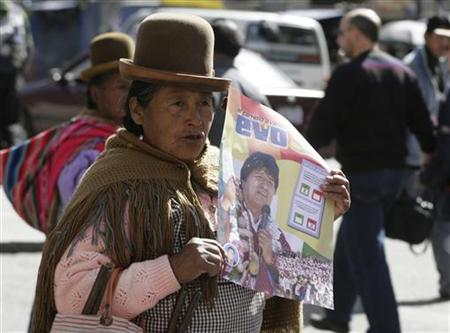Bolivia recall vote to proceed despite legal spat
August 1, 2008 - Reuters
By Eduardo Garcia
LA PAZ (Reuters) - A recall vote in Bolivia that could force out leftist President Evo Morales and a group of opposition governors will go ahead on August 10 despite a possible change in voting rules, the vice president said on Friday.
 (right) A supporter of Bolivia's President Evo Morales holds his campaign poster for a nation-wide recall vote in La Paz July 31, 2008. (Photo: REUTERS/David Mercado)
(right) A supporter of Bolivia's President Evo Morales holds his campaign poster for a nation-wide recall vote in La Paz July 31, 2008. (Photo: REUTERS/David Mercado)
In a surprise resolution on Thursday night, the National Electoral Court called for a change to voting rules to give the recall process more legitimacy after weeks of protestations of unfairness from the opposition.
Morales questioned the court's decision but hinted he would accept it.
"As the executive power we will take that resolution into account, but ... (I don't know) whether a decision taken by the National Electoral Court is more powerful than a law approved by Congress," he told reporters.
Morales proposed the recall law last year in an effort to undermine a group of opposition governors in eastern provinces who have challenged his economic and constitutional reforms. His initiative was passed by both chambers of Congress.
"There is a law, and these are just suggestions," Vice President Alvaro Garcia Linera told reporters, referring to the court's resolution.
Regardless of the voting rules, he said, the recall vote will take place.
Morales' rightist foes had complained that the rules for the recall vote favored the president. Of the country's nine governors, eight face recalls.
DIVIDED NATION
Under the recall vote law approved by Congress, the president and each governor would be forced out if the votes against them exceeded the percentage and the number of votes each received when elected in late 2005.
That meant each governor needed from 52 percent to 62.1 percent of the recall vote to prevail. The Electoral Court lowered that to 50 percent for the governors, but did not modify the rule on the number of votes.
The court did not change the rules for Morales, who still needs 46.3 percent of the vote to stay in office.
The power struggle between Morales, the country's first indigenous president, and a group of right-wing governors demanding more autonomy for their regions has forced him to put on hold some key reforms, chiefly his plan to redistribute land to poor farmers.
Polarization between the relatively prosperous eastern provinces and the western Andes, where Quechua and Aymara Indians strongly support Morales, has convulsed the country.
Morales, an Indian from a poor background, has described the recall as a face-off between Bolivians supportive of his drive to tighten the state's grip over the economy, and those who want pro-business politicians back in power.
"Two models of government are on the table; the one we defend, which is based on the nationalization of natural resources for the benefit of everyone, and ... the neoliberal (model)," Morales recently told supporters at a rally.
Recent polls suggest Morales will survive the vote, but analysts say he has lost appeal among the middle class and even among Indians, who are frustrated because they say their living standards are not improving.
(Additional reporting by Carlos Quiroga; Editing by Fiona Ortiz and Eric Walsh)